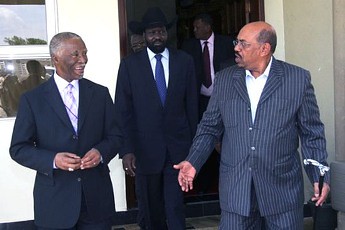
African Union mediator for the Sudans, former President Thabo Mbeki, with Presidents Silva Kiir of the Republic of South Sudan and Omar Hassan al-Bashir of the Republic of Sudan. The two sides may meet at the UNSC., a photo by Pan-African News Wire File Photos on Flickr.
Visa request from Sudan's Bashir puts US in difficult situation
Published September 23, 2013
Reuters
The Obama administration remained mum Monday on whether it will grant a visa to accused war criminal and Sudanese President Omar al-Bashir, who wants to address the U.N. General Assembly session in New York that begins this week.
Bashir told reporters over the weekend that he's booked a New York City hotel and plans to fly into the United States via Morocco, following the State Department confirming last week that he has indeed applied for a visa.
However, the active Secret Service list in New York did not show his name Monday night. The list is for security coordination purposes among various protective agencies, including the State Department, Secret Service and foreign diplomatic security details, and includes all the names and delegations traveling to New York this week for the U.N. opening.
Bashir's wishes have put the U.S. government in a tricky and troubling situation. The Sudanese leader has been indicted by the International Criminal Court in connection with the killing of thousands in Sudan's western province of Darfur. The coordinated campaign of killings is widely considered a textbook genocide -- the Sudanese government has been accused of working with armed militias to systemically kill non-Arab residents.
The ICC has already asked the U.S. to cooperate, should Bashir come to the United States, in connection with the arrest warrants filed against him in 2009 and 2010.
But the United States is also not a party to the ICC. And the government may instead be obligated to issue Bashir his visa despite his gory past.
Michael Rubin, a former Pentagon official and Middle East expert with the conservative-leaning American Enterprise Institute, said Monday the U.S. must issue Bashir a visa because it is the United Nations' host country.
"We have to," he told FoxNews.com. "But we are under no obligations to provide any services."
If Bashir is allowed to travel to New York, he'll be one of several unsavory characters milling around in the halls during the General Assembly session, including Zimbabwe's Robert Mugabe.
The session has often turned into a forum for some of the world's worst actors.
In September 2009, Muammar Qaddafi, the so-called "mad dog of the Middle East, was permitted to come to the United Nations in New York to deliver a speech but found securing accommodations more difficult -- trying to sleep in a tent in Central Park and Donald Trump's Westchester County estate before finally getting into a Manhattan hotel.
Rubin thinks Bashir is coming to the United Nations for no other reason but to "thumb his nose at the United States and the rest of the world."
"If you want that stage, there's no better place than the United Nations for rouges and homicidal maniacs," he said.
Besides Qaddafi, other outcast world leaders who have come to the United States to speak before the U.N. include Iranian ex-President Mahmoud Ahmadinejad and the late Venezuelan President Hugo Chavez.
The State Department did not respond to a question Monday on whether it has decided to issue a visa.
Last week, agency spokeswoman Marie Harf said only that the application had been submitted and that "a lot of considerations going into this request, including the outstanding warrant."
However, U.S. Ambassador to the United Nations Samantha Power called Bashir's request "deplorable."
"It would be more appropriate for him to present himself to the ICC and travel to the Hague," she said.
Bashir’s government is credited with helping end a Sudanese civil war in 2005, considered one of the longest and deadliest conflicts in modern history.
However, the court has charged Bashir on 10 criminal counts – seven in 2009 and three in 2010 – in connection with the ensuing Darfur conflict in which he allegedly used the Janjaweed militia in his fight against opposition forces.
Beyond the hundreds of thousand killed, millions of Sudanese people have been displaced by the fighting.
Of the seven counts in 2009, five are for crimes against humanity, including murder, rape and torture. The other two are for war crimes, or “intentionally directing attacks against a civilian population … or against individual civilians not taking part in hostilities,” according to court documents.
The court found sufficient evidence a year later to charge the Bashir, a former military leader who rose to power in 1989, with three counts of genocide – the deliberate and systematic destruction of an ethnic, racial or religious group.
No comments:
Post a Comment